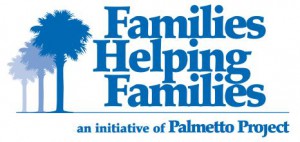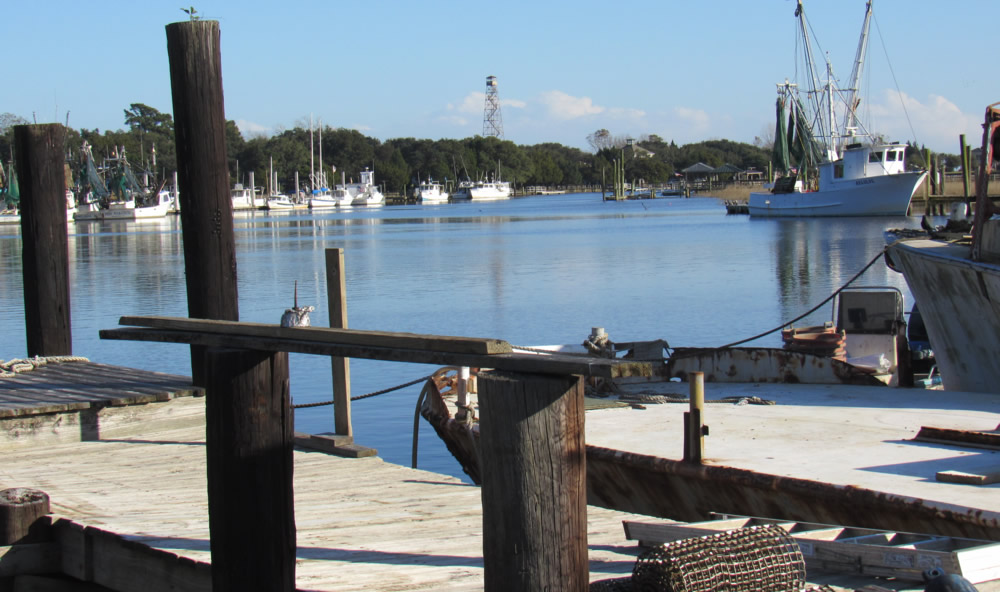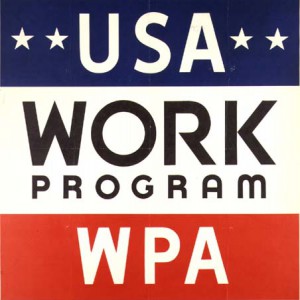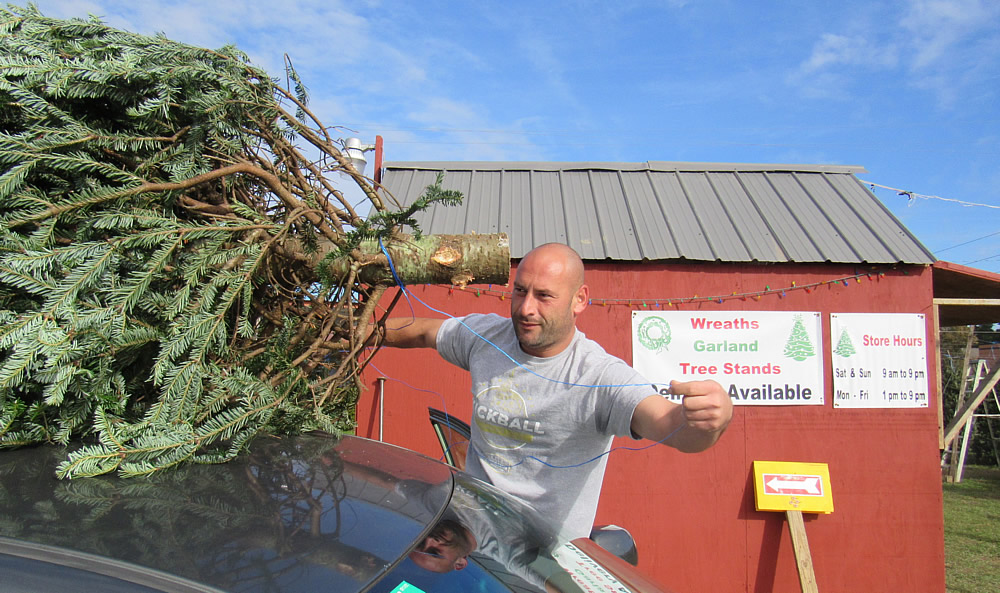HOLIDAY CINCH. Charleston resident Alex Markovski, a native of Macedonia, ties a Fraser fir onto a truck outside a Hunter Family Christmas tree sales location along Savannah Highway. Business, he says, has been brisk in recent days at the weather has turned a little chilly and Santa’s visit is expected in just three weeks. (Photo by Andy Brack)
IN THIS ISSUEPHOTO: Holiday cinch
FOCUS, Steve Skardon: Help for flood victims over holidays
BRACK: Legislature needs more strategic, long-term thinking
IN THE SPOTLIGHT: Charleston Green Commercial
PALMETTO POEM, Marjory Wentworth: The Christmas Apron
GOOD NEWS: Pinckney, Haley, Riley to be honored
FEEDBACK: Likes Haley on immigration
CALENDAR, Dec. 7+: A Christmas Story, holiday lights, more
MYSTERY: Maritime pastoral scene
S.C. ENCYCLOPEDIA: The New Deal
TODAY’S FOCUS
Helping South Carolina’s flood victims over the holidays
By Steve Skardon
DEC. 7, 2015 | The circumstances of many destitute South Carolinians this holiday season are among the most distressing since Hurricane Hugo. The aftermath of massive flooding, broken dams, and swollen rivers has left thousands in the Midlands and Lowcountry displaced and in chaos as they face the holiday season.
Assistance from both government and non-profit agencies is slow, and many of these families cannot expect to be in back in their own stable living situations for another six to eight months.
The effects of this netherworld weigh heavily on children, especially with Christmas only weeks away. Many of them have been forced to leave their friends and neighborhoods and sleep on the floors of generous family members, while their parents struggle to make ends meet.
This year, our Families Helping Families initiatives in the Lowcountry and the Midlands have been expanded to include large numbers of these displaced families. Many of them have been referred from our Community Flood Hub and other disaster assistance organizations in Columbia as well as our partners in rural areas and along the coast.
 Families Helping Families is a 25-year-old holiday assistance program that provides food, clothing, and Christmas gifts for 4,000 of South Carolina’s most destitute families. These families are referred to FHF by local social service agencies, and then assigned “sponsors” from among volunteer businesses, civic groups, and more affluent families and individuals.
Families Helping Families is a 25-year-old holiday assistance program that provides food, clothing, and Christmas gifts for 4,000 of South Carolina’s most destitute families. These families are referred to FHF by local social service agencies, and then assigned “sponsors” from among volunteer businesses, civic groups, and more affluent families and individuals.
The sponsors are given a profile of their families and its needs, and asked to provide new clothing, gift certificates for food, and Christmas presents for the children. Everything ends up at FHF warehouses in Columbia and Charleston and eventually disbursed in time for Christmas.
Monetary donations are happily accepted and used to assist unsponsored families, normally at a rate of $40 to $50 per family member.
A number of organizations have already stepped up to sponsor large numbers of our families. These include The State (50 families), Blue Cross Blue Shield of South Carolina (200 families) and Blythewood High School (250). Special thanks also to our very generous partner of 25 years, WIS-TV in Columbia.
- If you’d like to know more about sponsoring a family or simply make a contribution to this effort, visit us at www.familieshelpingfamilies.palmettoproject.org and click on the appropriate button on the left of the page.
Steve Skardon is executive director of the Palmetto Project.
COMMENTARYLegislature needs more strategic, long-term thinking
By Andy Brack, editor and publisher
DEC. 7, 2015 | Parents routinely tell their children to be smart about how they act. The state needs to take the same advice.
Case in point: South Carolina’s energy policy. Since the early 1990s, the state of South Carolina has actually had a policy to set a comprehensive state energy plan. But it’s been pretty toothless — a plan in name only, with all sorts of nice-sounding ![]() goals that don’t hold policymakers or anybody accountable.
goals that don’t hold policymakers or anybody accountable.
For example, the purpose of the plan includes ensuring “long-term access to adequate, reliable energy supplies,” but it doesn’t say how. It calls for “development and use of clean energy resources” including those from renewable sources like solar and wind, but doesn’t set any specific goals or measures.
But now that the State Energy Office has become a part of the Office of Regulatory Services, thanks to recent restructuring, the state and stakeholders are working fast and furious to come up with a real plan with some meat on the bones.
Why? Well, first, it’s long been required by law. But mainly, it’s needed to help the state plan for future needs and figure out ways for the state to maximize investments in energy so there’s enough over the long term.
It’s this kind of deeper thought — thinking that’s been stale for more than 20 years — that’s needed across the state in numerous areas. And that’s why today we again call on state legislators to start thinking bigger, more long-term and more strategically.
 We’ve long argued, in our annual plea for Palmetto Priorities, that businesses and nonprofits can’t exist without strategic plans and measurable goals. State government should do the same thing, meaning that lawmakers need to have big-ticket agendas that they can work together to move the state forward in a strategic way. Sure, there will be policy disagreements, but without a structured long-term plan, government will remain a mess embroiled in the purgatory of doing little or doing nothing to make real and meaningful differences in taxpayers’ lives.
We’ve long argued, in our annual plea for Palmetto Priorities, that businesses and nonprofits can’t exist without strategic plans and measurable goals. State government should do the same thing, meaning that lawmakers need to have big-ticket agendas that they can work together to move the state forward in a strategic way. Sure, there will be policy disagreements, but without a structured long-term plan, government will remain a mess embroiled in the purgatory of doing little or doing nothing to make real and meaningful differences in taxpayers’ lives.
So with little pomp or circumstance, we offer an updated Palmetto Priorities for legislators to consider as they prepare to start the 2016 session in January. Two notes: One item has been removed since 2009 — to raise the cigarette tax. Also, many of the following goals originally should have been completed by this year; we’ve updated them with new “due dates.”
POVERTY. Develop a broad-based anti-poverty agenda by 2020 that includes the jobs, education and health care components below to help lift the almost one in five South Carolinians in poverty into better conditions.
JOBS. Approve a Cabinet-level post by 2020 to add and retain 10,000 small business jobs per year. Politicians talk about helping small businesses. This would force them to.
EDUCATION. Cut the state’s dropout rate in half by 2020.
HEALTH CARE. Ensure affordable and accessible health care that optimizes preventive care for every South Carolinian by 2020. Take the federal funding now through the Affordable Care Act to allow 200,000 of the state’s neediest to get health insurance.
ENVIRONMENT. Adopt a real state energy policy that requires energy producers to generate 20 percent of their energy from renewable sources by 2020.
TAXES. Overhaul and stabilize the tax structure by 2018 through reforms that broaden the tax base and lower rates. This should include reimplementation of reasonable property taxes and removal of hundreds of millions of dollars of special-interest sales tax exemptions.
ELECTIONS. Increase voter registration to 75 percent by 2020 by reducing voting barriers and making it easier for all to vote.
CORRECTIONS. Cut the prison population by 25 percent by 2020 through creative alternative sentencing programs for non-violent offenders.
ROADS. Develop and implement a plan in 2016 that creatively taps several sources to generate an extra $1 billion every year for investment in the state’s crumbling system of roads and bridges.
POLITICS. Have a vigorous two- or multi-party political system of governance.
Andy Brack is editor and publisher of Charleston Currents and Statehouse Report. You can reach him at: editor@charlestoncurrents.com
IN THE SPOTLIGHTCharleston Green Commercial
 Charleston Green Commercial is a full-service commercial property management company that pays attention to detail, provides exceptional personal service and is committed to adding value to buildings. Offering professional property management, consulting and other services, the company strives to improve clients’ bottom lines with superior service, accessibility, reliability and a wealth of knowledge of the Charleston real estate market. By blending use of proven contractors and contacts with environmentally-conscious practices, the company helps clients stay on the leading edge of commercial real estate practices. More.
Charleston Green Commercial is a full-service commercial property management company that pays attention to detail, provides exceptional personal service and is committed to adding value to buildings. Offering professional property management, consulting and other services, the company strives to improve clients’ bottom lines with superior service, accessibility, reliability and a wealth of knowledge of the Charleston real estate market. By blending use of proven contractors and contacts with environmentally-conscious practices, the company helps clients stay on the leading edge of commercial real estate practices. More.
- To meet all of our underwriters, click here.
The Christmas Apron
By Marjory Wentworth, contributing editor
![]() Unfolding my grandmother’s apron, tucked
Unfolding my grandmother’s apron, tucked
deep in a box of Christmas decorations,
I rub my hands across the wrinkled
cream colored cloth as thin as gauze
and the bright red and blue boxes circling
the hem and see her standing at the stove
wearing her Christmas apron, stirring pots
on every burner, a turkey already roasting
in the oven, plates of gingerbread men
cooling on the counter. Each one her own
creation. Dozens of cousins, aunts, and uncles
circle the kitchen table in a haze
of coffee, bacon, and cigarettes. Damp wool
hats and mittens steam on the radiator
beneath the kitchen windows thick with frost.
My grandfather hauls in wood in from the shed,
smelling of pipe smoke and peppermints,
shaking fresh snow from his plaid flannel sleeves.
It’s as if my childhood was inscribed
on this stained handful of cloth, scattered
with a celebration of ornaments
tied with green ribbon and a tiny tag pinned
at the waistband — This was Nana’s apron.
Contributing editor Marjory Wentworth of Mount Pleasant is poet laureate of South Carolina. This poem is published with her permission
GOOD NEWSPinckney, Haley, Riley to be honored by Institute
Staff reports | The Riley Institute at Furman University in January will honor the late state Sen. Clementa Pinckney, the pastor slain in June with eight worshippers in Emanuel AME Church in Charleston, with the David H. Wilkins Award for Excellence in Legislative Leadership, the Institute has announced.
It said the posthumous recognition would be accepted by Pinckney’s widow, Jennifer, at the Institute’s annual awards dinner on Jan. 12, 2016, in Columbia.
“Senator Pinckney’s life was characterized by humility, intelligence and a commitment to those citizens left out of the economic mainstream in South Carolina,” said Riley Institute Executive Director Don Gordon. “He worked with colleagues in the Senate and elsewhere for the common good in our state. “
Also to be recognized with the Wilkins Award for Excellence in Civic Leadership are S.C. Gov. Nikki Haley and outgoing Charleston Mayor Joe Riley, both of whom will speak at the event and discuss their collaboration during the crisis involving the deaths the Emanuel Nine.
The annual ceremony honors David Wilkins, who served as speaker of the South Carolina House of Representatives and as U.S. ambassador to Canada. Wilkins will co-host the event with former U.S. Secretary of Education and former two-term governor of South Carolina Dick Riley and Furman President Elizabeth Davis. More.
In other Good News:
Tecklenburg inaugural committee. Charleston Mayor-elect John Tecklenburg is to hold a press conference today to announce his 2016 inaugural committee, which will be co-chaired by businesswoman Anita Zucker and attorney Wilbur E. Johnson. Richard Jerue, who is education director at the Gailliard Center, will be events coordinator. More detail will be provided at TecklenburgForMayor.com.
Qualey, McCoy say protect Spit. Charleston County Council member Joe Qualey and state Rep. Peter McCoy, both Republicans from James Island, sent a letter last week to the chair of Charleston’s state legislative delegation opposing development of Captain Sam’s Spit at the tail end of Kiawah Island. Qualey wrote that the Spit was “one of the last public access areas on Kiawah and we believe it must stay that way.” He said he would try to get council to pass a resolution to oppose a bill that weakened language on beachfront development. Read the letter.
Children’s Village is open. Magnolia Plantation and Gardens has a Children’s Village of nine child-size buildings that includes Santa’s workshop, a candy factory and elf bunk house that will be open until Dec. 31, 2015. There’s also a Christmas train that will take up to 35 passengers through the attraction, open from 8:30 a.m. to 4:30 p.m., on each weekend through Christmas. More: MagnoliaPlantation.com.
FEEDBACKGeorgian admires Haley on immigration
To the editor:
![]() As we are seeing now in our country, current immigrants are a bit different from those entering our country in the past. Yes, we should extend our welcome to those seeking refuge for their safety, but what we have never had before are members of ISIS who has a goal of destroying Americans and make no bones about it! The latest massacre in California proves this. If they are entering this country under the false pretense of seeking refuge, then these people need to be discovered BEFORE they murder innocent people. I am a third generation of German immigrants who arrived here in the late 1800s, but things were different then….my ancestors arrived to definitely make better lives for themselves and to contribute to making this a great country.
As we are seeing now in our country, current immigrants are a bit different from those entering our country in the past. Yes, we should extend our welcome to those seeking refuge for their safety, but what we have never had before are members of ISIS who has a goal of destroying Americans and make no bones about it! The latest massacre in California proves this. If they are entering this country under the false pretense of seeking refuge, then these people need to be discovered BEFORE they murder innocent people. I am a third generation of German immigrants who arrived here in the late 1800s, but things were different then….my ancestors arrived to definitely make better lives for themselves and to contribute to making this a great country.
I admire your wonderful governor in South Carolina, and what she is doing is trying to protect those of you in your beautiful state who still live in freedom! What happened in Charleston in the church massacre might only be a forerunner of what is to come if members of ISIS are permitted to enter the country and plan to massacre South Carolinians! Charleston was a wonderful example of how Christianity can thrive, but unless these Syrian refugees are thoroughly vetted upon entering the U.S., we could be harboring the enemy wearing sheep’s clothing. Instead of belittling your governor, you should be thankful that she loves her people so much that she is thinking only of your safety under her watch!
— Carolyn Kershner, Augusta, Ga.
EDITOR’S NOTE: Thanks for your thoughts. We don’t disagree with your first paragraph, but are not big fans of the Haley-esque xenophobia and fear-mongering in the second. Our recent column [“Pandering to fear isn’t the American way”] didn’t suggest letting ISIS into the U.S.
Rant. Rave. Tell us what you really think. If you have an opinion on something we’ve offered or on a subject related to the Lowcountry, please send your letters of 150 words or less to: editor@charlestoncurrents.com. Our feedback policy.
CALENDARFrom the leg lamp to holiday parade of boats
 (NEW) A Christmas Story: Through Dec. 20: 7:30 p.m., Dec. 10-12, Dec. 17-19; matinees at 3 p.m. on Dec. 13 and 20, Dock Street Theatre, Charleston. Enjoy the story about Ralphie, his BB gun and the leg lamp in this holiday classic that returns for the season. Tickets are $30 to $67 for adults. More.
(NEW) A Christmas Story: Through Dec. 20: 7:30 p.m., Dec. 10-12, Dec. 17-19; matinees at 3 p.m. on Dec. 13 and 20, Dock Street Theatre, Charleston. Enjoy the story about Ralphie, his BB gun and the leg lamp in this holiday classic that returns for the season. Tickets are $30 to $67 for adults. More.
Holiday Festival of Lights: Through Jan. 3, 2016, James Island County Park. The annual light festival with millions of lights and lots of family fun opens for a seven-week run. Lots of information is online here.
Path to Secession: 11:15 a.m., Dec. 8, John’s Island Regional Library, Johns Island. Join Charleston County Public Library historian Nic Butler to follow 50 years of events that led the state to secede from the union in 1860 in this installment of the library’s history series. The talk will be also offered 6 p.m., Dec. 9, at the main library on Calhoun St.
Stern lecture: 6 p.m., Dec. 10, Charleston Library Society, 164 King St., Charleston. “Remembering of the Remarkable Ted Stern: Charleston’s Compass” will be the focus of a lecture by Bob Macdonald, director emeritus of the Museum of the City of New York and vice chair emeritus of the S.C. Aquarium. Introduction by Mayor Joseph P. Riley Jr. Cost is $15 for non-members; $10 for members. Tickets.
Charleston Holiday Parade of Boats viewing party: 5 p.m. to 8 p.m., Dec. 12, Charleston Maritime Center, Charleston. Join the Rotary Club of Charleston for fun, barbecue, great music and the best location in town to watch the annual Parade of Boats, a holiday tradition. Tickets are $25 for adults, $5 for kids. Chance to win a $38,000 boat is $100 per ticket. More.
(NEW) West Ashley Senior Forum: 2 p.m., Dec. 15 (new date), John Wesley United Methodist Church, 626 Savannah Highway, West Ashley. The city of Charleston will host a forum on the preliminary design for a new senior center and its grounds. The new center will be located on the campus of Bon Secours St. Francis Hospital.
(NEW) Museum Mile Month is coming. For the cost of one $25 ticket throughout January 2016, adults can enjoy visits to 11 attractions along Charleston’s Museum Mile. These include the Aiken-Rhett House Museum, Charleston Museum, Nathaniel Russell House and Museum and The Old Exchange and Provost Dungeon. More: CharlestonsMuseumMile.org.
Bird walks: 8:30 a.m. to noon, every Wednesday and Saturday. This is the time of year that a great variety of migrating birds fly through the Lowcountry so what better time to take part in one of the regular early morning bird walks at Caw Caw Interpretive Center in Ravenel. Pre-registration is suggested. Cost is $5. Walks also are conducted on James Island and Folly Beach. Learn more online.
If you have an event to list on our calendar, please send it to editor@charlestoncurrents.com for consideration. The calendar is updated weekly on Mondays.
MYSTERY PHOTOMaritime pastoral
 Boy, howdy — doesn’t this maritime scene feel peaceful as all get-out? But where is it? Give us a guess and we’ll take a drink of Christmas cheer on your behalf (for each correct guess?) Send your guess to: editor@charlestoncurrents.com— and make sure to include the name of the town in which you live.
Boy, howdy — doesn’t this maritime scene feel peaceful as all get-out? But where is it? Give us a guess and we’ll take a drink of Christmas cheer on your behalf (for each correct guess?) Send your guess to: editor@charlestoncurrents.com— and make sure to include the name of the town in which you live.
 Last week’s Mystery Photo brought in just three guesses, but Contractor Jim Vanas of Charleston nailed it by noting that the photo by Deborah Getter was taken of an old tower at Colonial Dorchester State Historic Site — “great place for wedding pics, and to see and experience a tabby structure intact.” Hats off also to Chris Brooks of Mount Pleasant and Kristina Wheeler of West Ashley for correctly identifying the structure.
Last week’s Mystery Photo brought in just three guesses, but Contractor Jim Vanas of Charleston nailed it by noting that the photo by Deborah Getter was taken of an old tower at Colonial Dorchester State Historic Site — “great place for wedding pics, and to see and experience a tabby structure intact.” Hats off also to Chris Brooks of Mount Pleasant and Kristina Wheeler of West Ashley for correctly identifying the structure.
- If you have a picture with which you’d like to stump our readers, send it along to editor@charlestoncurrents.com.
The New Deal
S.C. Encyclopedia, part one of two| The New Deal was a collection of federal programs enacted between 1933 and 1939 to solve the problems created by the Great Depression. In South Carolina the New Deal brought three R’s: recovery for farmers, bankers, textile mill owners, and small businessmen; relief for the unemployed and destitute; and reform in labor-management relations, banking, sale of securities, and retirement. In the process the New Deal radically increased the role of the federal government in the state’s economy by creating permanent acreage allotment programs, agricultural credit, compulsory minimum wage / maximum hours requirements, protection for laborers who sought to unionize, Social Security benefits, a public welfare system, the Federal Deposit Insurance Corporation to protect depositors, the Federal Housing Administration to expand housing opportunities, and the Rural Electrification Administration to electrify the countryside.
 Even before the stock market crash in October 1929, South Carolina had suffered several years of economic downturn. Cotton began to decline as early as 1920, a victim of overproduction and the boll weevil. In the next five years, the average value of farmland dropped from $65 to $43 per acre. During the 1920s farmers abandoned one-sixth of South Carolina’s farms. The collapse of the cotton economy brought down forty-nine percent of the state’s banks. In the mid-1920s the state’s textile economy joined farming in economic depression. In 1929 shares of stock in the state’s 230 textile mills sold for one-half their 1923 price. The onset of the Great Depression made wretched conditions even worse. By 1931 cotton was selling for 6{cents sign} per pound, actually below the cost of production, and the cash value of South Carolina’s farm commodities had dropped by half since 1929. In 1932 rural poverty was so severe that taxes were delinquent on almost half the state’s farms. There was no market for the securities of textile mills, and average annual textile wages plummeted from $719 in 1929 to $495 in 1932. Not surprisingly, by 1933 one-fourth of the state’s population was eligible for public relief.
Even before the stock market crash in October 1929, South Carolina had suffered several years of economic downturn. Cotton began to decline as early as 1920, a victim of overproduction and the boll weevil. In the next five years, the average value of farmland dropped from $65 to $43 per acre. During the 1920s farmers abandoned one-sixth of South Carolina’s farms. The collapse of the cotton economy brought down forty-nine percent of the state’s banks. In the mid-1920s the state’s textile economy joined farming in economic depression. In 1929 shares of stock in the state’s 230 textile mills sold for one-half their 1923 price. The onset of the Great Depression made wretched conditions even worse. By 1931 cotton was selling for 6{cents sign} per pound, actually below the cost of production, and the cash value of South Carolina’s farm commodities had dropped by half since 1929. In 1932 rural poverty was so severe that taxes were delinquent on almost half the state’s farms. There was no market for the securities of textile mills, and average annual textile wages plummeted from $719 in 1929 to $495 in 1932. Not surprisingly, by 1933 one-fourth of the state’s population was eligible for public relief.
The New Deal attacked these problems through a host of innovative programs and the creation of a myriad of new federal agencies. Managed on the floor of the U.S. House of Representatives by Congressman Hampton P. Fulmer of Orangeburg, the Agricultural Adjustment Act created the Agricultural Adjustment Administration (AAA), which raised farm prices in South Carolina by reducing surpluses through a permanent acreage-reduction program. In midsummer 1933 farmers in the Palmetto State plowed under 425,000 of their 1,770,000 acres of cotton. In subsequent springs they planted only their allotment. Farmers were paid for acres destroyed or not planted. They also enjoyed higher prices because of the reduction in supply. Similarly, the state’s 23,000 tobacco farmers in the Pee Dee reduced their acreage by thirty percent and enjoyed an increase in price per pound from 11.14{cents sign} in 1932 to 21.60{cents sign} in 1934. The reduction in acreage of both crops reduced the need for tenants and thus hastened migration from the countryside to cities and towns. At the same time, the Rural Electrification Administration (REA), set up in 1935, made farm life more tolerable by encouraging rural electrification. The percentage of farms in South Carolina with electricity increased from two in 1934 to almost fifteen by 1940.
Meanwhile the National Industrial Recovery Act of 1933 created both the National Recovery Administration (NRA) and the Public Works Administration (PWA) to bring about business recovery, which in South Carolina meant textiles. Under the NRA, each industry drew up a Code of Fair Competition to allow firms within the industry to raise prices by cutting back production. NRA Code Number 1, the textile code, which was partly written by textile magnate Thomas Marchant of Greenville, required the 230 mills in South Carolina to reduce production from the customary 105 hours a week to 80 hours a week. At the same time, the code forced mills to eliminate child labor, pay a minimum wage of $12 a week, employ each worker for no more than 40 hours a week, and allow workers the right to unionize.
Flaws in the code and its ineffective enforcement led to a host of strikes culminating in the General Textile Strike of 1934, which involved half of South Carolina’s eighty thousand workers. The strike ended on management’s terms, and its failure had a chilling effect on unionization in South Carolina for years thereafter. Despite the protection of the New Deal’s National Labor Relations Act of 1935, which punished mill owners for discharging workers because of union activity, union organizers in South Carolina enjoyed little success in their attempts to unionize the cotton industry in the late 1930s. By 1980 only 6.7 percent of the state’s labor force was unionized, the second smallest percentage in the nation. Workers at least could thank the New Deal for the Fair Labor Standards Act of 1938, which set a permanent minimum wage and maximum workweek.
(To be continued)
– Excerpted from the entry by Jack Irby Hayes. To read more about this or 2,000 other entries about South Carolina, check out The South Carolina Encyclopedia by USC Press. (Information used by permission.)
About Charleston CurrentsOUR UNDERWRITERS
Charleston Currents is an underwriter-supported weekly online journal of good news about the Charleston area and Lowcountry of South Carolina.
- Meet our underwriters
- To learn more about how your organization or business can benefit, click here to contact us. Or give us a holler on the phone at: 843.670.3996.
OUR TEAM
Charleston Currents offers insightful community comment and good news on events each week. It cuts through the information clutter to offer the best of what’s happening locally.
- Mailing address: O. Box. 22261 | Charleston, SC 29413
Phone: 843.670.3996
Charleston Currents is provided to you twice a week by:
- Editor and publisher: Andy Brack, 843.670.3996
- Contributing photographer: Michael Kaynard
- Contributing editor, real estate: Doug Holmes
- Contributing editors, seniors: Catherine LaFond, Mary Ross McQuage
- Contributing editor, money: Kyra Morris
- Contributing editor, Palmetto Poem: Marjory Wentworth
SUBSCRIBE FOR FREE
Subscriptions to Charleston Currents are free.
- Click here to subscribe.
- Unsubscribe. We don’t want to lose you as a reader of Charleston Currents, but if you must depart, please click here.






 We Can Do Better, South Carolina!
We Can Do Better, South Carolina!
























